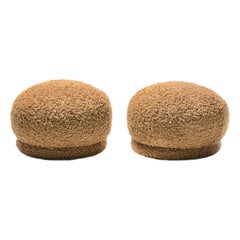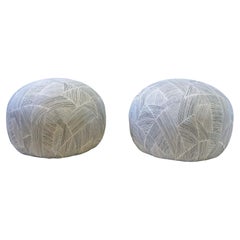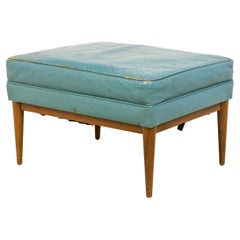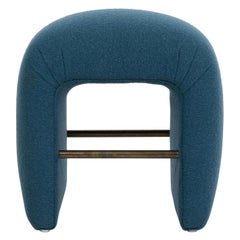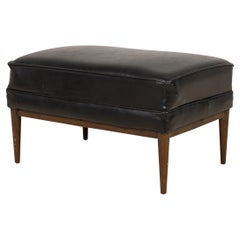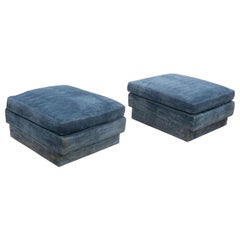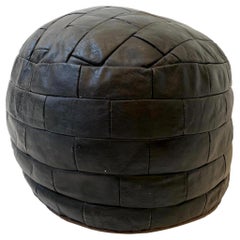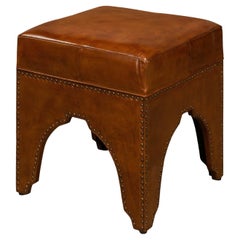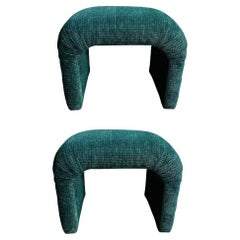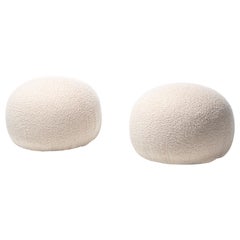Directional Footstools
A brand known to vintage mid-century modern furniture collectors everywhere, Directional Furniture opened its doors after American furniture designer Paul McCobb created the high-end Directional Modern line of sofas distributed by the New York–based Modernage Company.
In his pivotal introduction of postwar modernism to the mass market, the revered Massachusetts-born McCobb had established several lines, from the affordable and refined Planner Group for Winchendon to the swooping and unexpected arms of the Symmetric Group for Widdicomb, a Shaker-inspired collection that included a sofa and a lounge chair. Like all of McCobb’s designs, the Directional pieces for Modernage are defined by a sleek aesthetic in which the focus is on elegant functionality, frequently using fine materials such as brass and walnut. In 1949, in partnership with New York furniture salesman B.G. Mesberg, McCobb set up the Directional Furniture Company.
The pair’s first pieces were upholstered chairs, intended to harmonize with the modular Multiplex pieces designed by Martin Feinman. McCobb then designed an array of furniture including storage, dining, seating, desks and other pieces with details such as leather tops, wood finishes and Roman Travertine surfaces. While Directional stopped production of McCobb’s work in the early 1960s, it still released numerous pieces by leading designers manufactured by a variety of companies.
Designer Paul Evans led the factory for a time after joining in 1964. His provocative work for the company often reflected his understanding of materials from his early training as a silversmith, such as the popular Cityscape series — a milestone in brutalist design — with its blocky forms accented with brass and chrome. At his shop in Lambertville, New Jersey, he collaborated with a design team to clad furniture pieces in metallic surfaces, like the Argente line that began production in 1968 and involved an acetylene torch to give its aluminum material a textural quality. He also worked on the Sculpted Bronze series with hand-formed resin shaped over plywood or steel that was then coated with atomized bronze.
Other Directional designers included Vladimir Kagan, who contributed biomorphic sofas and swivel chairs; Milo Baughman, who created tables and dressers inspired by Scandinavian modernism; and Jack Lenor Larsen, who covered sofas in dynamically patterned fabric.
Find authentic Directional Furniture seating, tables, case pieces and storage cabinets from top sellers around the world on 1stDibs.
1980s American Post-Modern Vintage Directional Footstools
Upholstery, Faux Fur
1980s American Modern Vintage Directional Footstools
Fabric, Foam
20th Century American Mid-Century Modern Directional Footstools
Leather, Upholstery, Wood, Walnut
1970s American Mid-Century Modern Vintage Directional Footstools
Brass
20th Century American Mid-Century Modern Directional Footstools
Upholstery, Wood, Walnut
1960s Mid-Century Modern Vintage Directional Footstools
Velvet
1960s Swiss Vintage Directional Footstools
Leather
21st Century and Contemporary Indian Modern Directional Footstools
Leather
21st Century and Contemporary Ukrainian Modern Directional Footstools
Steel
2010s French Directional Footstools
Alabaster, Bronze
1950s American Mid-Century Modern Vintage Directional Footstools
Fabric, Wood
2010s Australian Hollywood Regency Directional Footstools
Sheepskin
Mid-20th Century American Mid-Century Modern Directional Footstools
Upholstery, Wood
20th Century American Mid-Century Modern Directional Footstools
Steel
1970s Vintage Directional Footstools
Fabric
1960s American Mid-Century Modern Vintage Directional Footstools
Wood, Fabric
20th Century American Mid-Century Modern Directional Footstools
Metal, Brass
1980s English Mid-Century Modern Vintage Directional Footstools
Fabric, Walnut
1990s American Post-Modern Directional Footstools
Upholstery
1990s American Post-Modern Directional Footstools
Bouclé
Directional footstools for sale on 1stDibs.
Creators Similar to Directional
- 1stDibs ExpertFebruary 22, 2021While a pear-shaped ring can be worn either way, most commonly it is worn with the tip of the diamond facing upwards to look like a falling teardrop when the hand is raised. This also helps create the impression of longer fingers.
